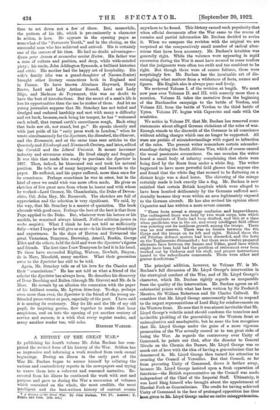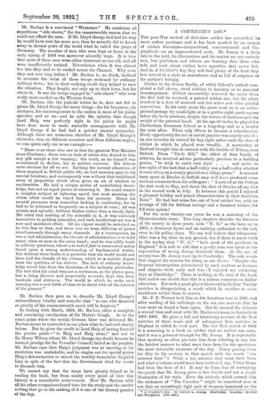A HISTORY OF nib GREAT WAR.* Ire publishing his fourth
volume Mr. John Buchan has com- pleted the revised form of his history of the War. Seldom has so impressive and informing a work resulted from such casual beginnings. During an illness in the early part of the War Mr. Buchan began to amuse himself by collating the various and contradictory reports in the newspapers and trying to weave them into a coherent and reasoned narrative. Re- covered from his illness he continued the work with zest and purpose and gave us during the War a succession of volumes which contained on the whole, the most credible, the most intelligent and the best-written history of current events • A History of the Great War. By John Buchan, Vol. IV, London; T, Miami and bons, 126a. net.1
anywhere to be found. This history earned such popularity that when official documents after the War came to the rescue of surmise and partial information Mr. Buchan decided to revise it. When we compare the revision with the original we are surprised at the comparatively small number of radical alter- ations that have been necessary. Mr. Buchan's intuition was generally right. While the volumes were appearing in rapid succession during the War it must have seemed to some readers that the judgments were often too swift and too confident to be right. But though there were of course failures, these were surprisingly few. Mr. Buchan has the invaluable art of dis- entangling what matters from a wilderness of facts, names and figures. His English also is always pure and lively.
We reviewed Volume L of the revision at length. We must now pass over Volumes II- and III. with scarcely more than a mention. Volume IL takes the narrative from the beginning of the Dardanelles campaign to the battle of Verdun, and Volume III, from the battle of Verdun to the third battle of Ypres. Volume IV. begins with Caporetto and ends with the armistice.
We notice in Volume IV. that Mr. Buchan has removed some statements about alleged German violations of the rules of war. Enough stands to the discredit of the Germans in all conscience without adding charges which can no longer be supported. All
wars are prolific of misunderstandings with regard to infraction of the rules. The present writer remembers certain misunder- standings during the South African War, which of course caused the usual passionate accusations. On one occasion the writer heard a small body of infantry complaining that shots were being fired by the Boers from under a white flag. The writer happened to have more powerful field glasses than anyone else and found that the white flag that seemed to be fluttering on a distant kopje was a dead horse. The shivering of the mirage certainly made it look exactly like a flag. Mr. Buchan is now satisfied that certain British hospitals which were alleged to have been bombed deliberately by the Germans suffered acci- dentally because they were within an area legitimately exposed to the German aircraft. He has also revised his opinion about Caporetto and has written a more severe censure.
"These facts reveal a strange confusion and improvidence. The endangered front was held by two weak corps, into which the malcontents of Turin had been drafted, and this at a time when pacificism was in the air, and every intelligent field officer was pointing out its insidious growth among the troops. There was no real reserve. There was no liaison between the 4th Corps and the troops on its left and right. Behind them the old Friulian defence system had been discarded, and the forts on the Tagliamento dismantled ; but there were twelve prepared alternate lines between the Isonzo and Udine, good lines which might have been held had the problem of retirement ever been worked out by Cadorna and his staff, and proper instructions issued to the subordinate commands. There were other and graver derelictions."
The principal addition, however, to Volume TV. is Mr. Buchan's full discussion of Mr. Lloyd George's intervention in the strategical conduct of the War, and of Mr. Lloyd George's character, which Mr. Buchan rightly regards as inseparable from the quality of the intervention. Mr. Buchan agrees on all substantial points with what has been written by Sir Frederick Maurice, Sir William Robertson and Sir Charles Callwell. He considers that Mr. Lloyd George unnecessarily failed to respond to the urgent representations of Lord Haig for reinforcements on the Western front. He sees that it was almost inevitable that Mr. Lloyd George's volatile mind should condemn the tenacious and invincible plodding of the generalship on the Western front as unimaginative and unadaptable, but he none the less recognises that Mr. Lloyd George under the guise of a more vigorous prosecution of the War actually caused us to run great risks of losing the War. As regards the controversy over Unity of Command, he points out that, after the disaster to General Nivelle on the Chemin des Dames, Mr. Lloyd George was so much out of love with the idea of having a generalissimo that he denounced it. Mr. Lloyd George then turned his attention to creating the Council of Versailles. But that Council, so far from procuring Unity of Command, drove it farther away, because Mr. Lloyd George insisted upon a fresh separation of functions—the British representative on the Council was made independent of the Chief of the Imperial Staff. Ultimately, it was Lord Haig himself who brought about the appointment of
Marshal Foch as Generalissimo. The credit for having achieved Unity of Command in the face of prolonged opposition has thus been given to Mr. Lloyd George under an entire misapprehension. Mr. Buchan is a convinced "Westerner." He condemns all superfluous "side shows," for the unanswerable reason that we could not afford the men. If Mr. Lloyd George had had his way he would have sent far more men than he actually did to knock away in distant parts of the world what he called the props of Germany. The number of men who were kept at home in the early spring of 1918 was moreover absurdly large. It is true that most of these men were either immature or too old, and all were insufficiently trained. Nevertheless when it was almost too late they had to be rushed across the Channel. Why were they not sent long before ? Mr. Buchan is, we think, inclined to overrate the value of these troops reckoned by ordinary military tests ; but to their undying credit they helped to save the situation. They fought, not only up to their form, but far above it.. It was the troops engaged in "side shows" who were really most needed on the Western front.
Mr. Buchan, like the judicial writer he is, does not fail to praise Mr. Lloyd George for many things—for his buoyancy, his alertness, his encouragement to the nation in most of his public speeches and so on—and he adds the opinion that though Lord Haig was perfectly right in his policy he might have done more to make amicable arrangements with Mr. Lloyd George if he had had a quicker mental sympathy. Although there are numerous sketches of Mr. Lloyd George's character, seen on different occasions and from different angles, we can quote only one as an example :— " There were those who saw in him the greatest War Minister since Chatham ; there was no lack of critics who denied to him any gift except a low cunning ; the truth, as he himself was accustomed to declare, lay in neither extreme. His defects were obvious for all to see. Lacking the normal education of those engaged in British public life, he had amazing gaps in his mental furniture, and consequently was without that traditional sense of proportion which often gives an air of wisdom to mediocrities. He had a unique power of assimilating know- ledge, but not an equal power of retaining it. He could master a complex subject at lightning speed, but next morning the whole affair would be wiped from his memory. Hence his mental processes were somewhat lacking in continuity, for he had to be informed so frequently on a subject de novo ; all was atomics and episodic, brilliant flashes rather than a steady light. His mind had nothing of the scientific in it, it was curiously Insensitive to guiding principles, and each intellectual act was a new and unrelated effort. All his vigour would be switched on to this line or that, and there was no even diffusion of power simultaneously through many channels. As a consequence, he was a bad administrator, for the art of administration is to hold many wires at once in the same hand ; and he was oddly inept in military questions, where a so-called _flair is nonsensical unless based upon a strong understanding of fundamental truths. But without these faults it is probable that the world would not have had the benefit of his virtues, which to a notable degree were the qualities of his defects. The lack of ordinary know- ledge saved him from the dominion of the ordinary platitudes. The fact that his mind was not a continuum, as the phrase goes, but a thing discrete and perpetually re-made, kept him from lassitude and staleness. The world to which he woke each morning was a now birth of time to be faced with all the interest of the pioneer."
Mr. Buchan then goes on to describe Mr. Lloyd George's extraordinary vitality and remarks that "to one who deserved CO greatly of the commonwealth much will be forgiven."
In dealing with March, 1918, Mr. Buchan offers a complete and convincing exculpation of Sir Hubert Gough. As to the exact point where the terrific German blow was delivered Mr. Buchan seems to contradict in one place what he had said shortly before. But he gives the credit to Lord Haig of having foretold the precise point—" to Haig and Haig alone," and not to Sir Henry Wilson, whom Mr. Lloyd George (no doubt because he wanted prestige for the Versailles Council) hailed as the prophet. Mr. Buchan says that Haig's judgment was as unerring as his resolution was unshakable, and he singles out for special praise Haig's determination to attack the terribly formidable Siegfried Line in spite of the fact that the Government tried for weeks to dissuade him.
We cannot say that the maps have greatly helped us in reading the book, but from nearly every point of view this history is a remarkable achievement. How Mr. Buchan with all his other occupations found time for the study and the careful writing that go to the making of it is one of the literary puzzles of the day.



































 Previous page
Previous page